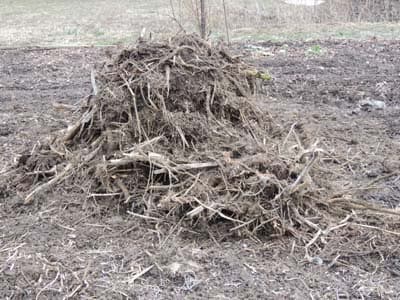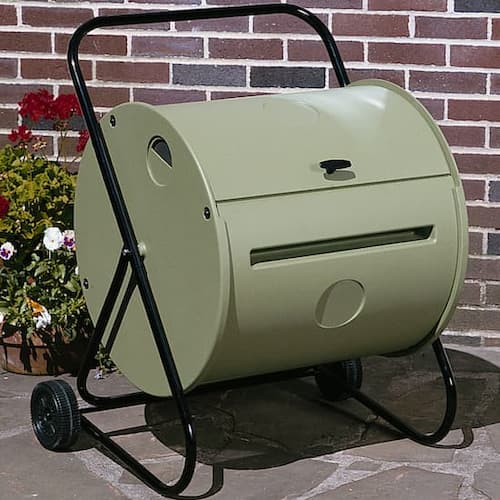How to Make Compost - The Composting Process

The How To's of Making Compost
The natural process of plant decomposition is as old as the earth itself. In nature, trees and plants die and begin to decay. For small, thin grasses, the process is very quick, as little as a few weeks to a month. On the other hand, big tree trunks slowly decay in a wooded area, over the course of a decade or more. This is nature’s composting process. Humans observed nature and slowly discovered how to make compost over thousands of years. Then, they wisely utilized it to produce better and healthier crops.
When Man arrived on the planet, the process of decomposition was going on all around him. He never gave it a thought. Then one day, probably thousands of years ago, Man piled up some plant matter and discovered it quickly decomposed. At the time, he probably thought little of it, until one day he noticed plants growing in the pile. Seeds from a prior year had sprouted inside of the decomposed pile. He marveled at how fast and how big the plant grew. He harvested more and bigger vegetables from the plants growing in the pile of decomposed matter. And it suddenly dawned on him what was going on. The value and usefulness of compost was discovered. The world of gardening has never been the same since.
For countless centuries after, Man experimented with composting techniques, along with the use of this valuable fertilizer and soil amendment.
Today, we reap the benefits of this centuries-long learning.
Home Composting is Easy
Over the long term, there is not much you can do wrong with a compost pile (also called the compost heap) Pile up any organic matter, and it decomposes over time. Simply pile plant waste into a heap in a corner of your garden, and it will decompose…..eventually. Most gardeners seek to speed up the process, and avoid the pitfalls of bad odor and attracting unwanted pests. They turn to compost bins, barrels, and tumblers.
A well-maintained and active composting pile converts raw organic material into compost in as little as 30 days. Left to nature, a compost heap can take from several months to a year or more, to completely decompose. The byproduct of active decomposition is heat (and sometimes, odor). Have you ever seen a large pile of wood chips, at your local nursery in the middle of the winter? You may have observed it as “smoking”. A composting pile can actually become so hot, that it ignites. This occurs in large, town, or industrial composting sites.
Composting Process Techniques
The first step is to decide what technique to use. Basically, your efforts can be passive or proactive.
Passive – Just pile up the compostable materials and let nature do its thing. It takes less effort on your part. But, it takes longer for plant matter to decompose.
Proactive – You play an ongoing role in making the compost, by turning the pile, adding water as needed, and adjusting the ratio of Green to Brown materials. Your efforts will significantly speed up the decomposition process.

Determining the Right Composting Process for You
Next, you have to decide which process is right for you. The most common composting processes are:
Compost Pile or Heap – This passive method requires the least amount of effort. Simply pile up compostable materials, and let nature do the job. Be prepared to wait…. several months to a year. Some consider it unsightly.
Burying Compost – Dig a hole or a trench. Put compostable material in it. Then, bury it. … Out of sight, out of mind.
Bins and Barrels – It’s an aesthetically neat way to store compost while it is decomposing. Unless you turn it from time to time, it is largely passive and will take a while to decompose.
Compost Tumblers – The fastest way to make compost, is to use a compost tumbler. It makes turning and aerating the materials a cinch. Under ideal conditions, it makes finished product in as little as 30 days!
Key Requirements for Successful Composting
Clean, organic plant matter. By clean, we mean material that has not been treated with chemical pesticides or herbicides.
The right mix of materials Green (Nitrogen) materials and Browns (Carbon material).
Microbes and bacteria, which break down component materials.
Air Circulation
Moisture – should be 40% to 60%
Temperature
How to Make Compost
Gather organic plant materials. Add organic matter from your garden and yard.
Chip or shred larger branches and plant stalks. The more surface area bacteria have to work, the quicker the decomposition.
You don’t have to add all the materials at once. You can add them as you get them until the barrel, bin or pile is full.
Include vegetable and plant waste from your kitchen, including eggshells, coffee grounds, tea bags, spoiled vegetables, fruits, etc.
Alternate layers of green and brown materials. This helps to get the decomposition process started and keep it working. When decomposition is going on, we often call it “cooking”.
Keep the pile moist, but not wet.
If you are able, turn the pile over from time to time, to maximize air circulation to the bacteria and microbes that “eat” and convert your pile into rich compost.
Use the compost after it has almost completely turned into soil. It is rich in nutrients and minerals.
Apply compost liberally around your plants as a mulch, or mix it into the soil.
Did you know? Along with the heat, odor is another common by-product of the composting process. Keep odor to a minimum, by turning the pile regularly. One of the most common culprits is grass clippings piled too thickly. Mix all materials together well.
Related Articles
People who like this article will also like:
Please support our site. Shop for:
- rmmatthews100@hotmail.com
- 585-721-6528
- Rochester, NY
©1999-2026 GardenersNet.Com, All Rights Reserved

